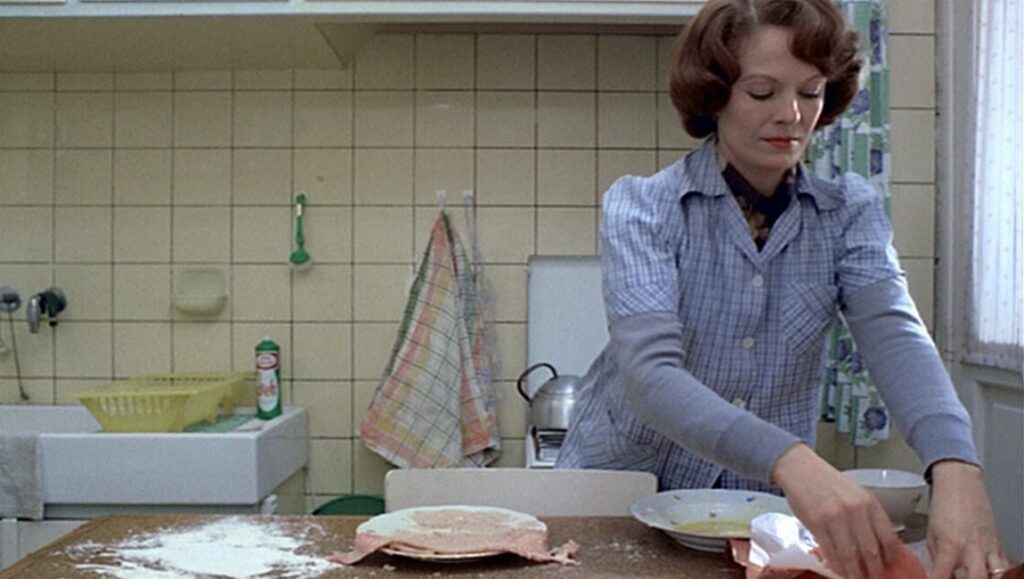The title, Jeanne Dielman, 23, Quai du Commerce, 1080 Bruxelles, gives away this film’s clinical fascination with the everyday by defining the central character only by where she lives. With about as much narrative as Michael Snow’s Wavelength, director Chantal Akerman creates a static portrait of two days in the life of a widowed Belgian housewife, but “ordinary” would be a tricky descriptor here — most of her activities (and most of the film’s nearly-four hour runtime) fit into the standard cooking-and-cleaning mold, except Dielman also sells herself as a prostitute when her son goes off to school. Akerman and perfectionist cinematographer Babette Mangolte shoot each of the three john scenes with the same flat, rote composition as when Dielman’s merely cooking potatoes. Formalism is kept to a rigid, almost academic shape, leaving only the performance from Delphine Seyrig to provide subtle change, as days continue to drag. What starts as a merely uncomfortable body trapped in a tight frame and small spaces slowly becomes a figure falling apart, out of frame, as routines begin to break.
Simple in structure and composition, yet using that simplicity to find routes to narrative and political complexity, Jeanne Dielman stands its ground as the preeminent example of postmodern minimalist cinema.
Drawing upon experimental works for its visual technique (not just the aforementioned Snow, but the one room static camera projects of Andy Warhol), Akerman hardly ever grants Dielman an explicit interiority. Psychological readings come through slight variations on Dielman’s physical actions: how she stares into the distance, or the increasing amount of time she walks out of the frame. This abstraction — giving the viewer only Dielman’s body as a pathway to instability over a series of long-takes — allows the formal process and the editing to signify her steady loss of control. With her own visual language, Akerman equates an economic prostitution, and the humdrum horrors of uneventful housework, to the dehumanizing consequences of the patriarchy. Then, by the shock of a swift murder, Jeanne Dielman ends. The pace and Dielman herself finally breakdown. This act announces itself as the key to piece the film together. Was it all a three-plus-hour celebration of the maligned role of the housewife? Was it a revenge-horror film, with Dielman finally striking against the patriarchal “housewife” role she’d been forced into? That these and several hundred other questions arise from the formal decisions of an easily-summarized film may explain why feminist and avant-garde-inclined critics (of course not mutually exclusive) point to Jeanne Dielman as a major work worthy of continued consideration. Comfortably settling into one reading or another might draw ire from the cultish attraction the film has garnered — it’s better to leave it as a multifaceted text. Simple in structure and composition, yet using that simplicity to find routes to narrative and political complexity, Jeanne Dielman stands its ground as the preeminent example of postmodern minimalist cinema.
Part of Kicking the Canon – The Film Canon.


Comments are closed.